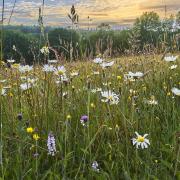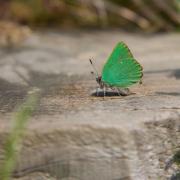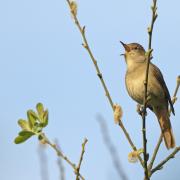Debbie Graham talks to Captain Mark Phillips and Peter Phillips about Gatcombe Horse Trials and finds it’s very much a family affair. Photography by Carl Hewlett

There is a sense of ordered chaos at Aston Farm on the Gatcombe estate. The cell phone mast is down so no-one can use their mobile, the dogs have escaped from the kitchen, the man in charge is nowhere to be found, and, to cap it all, they have run out of coffee.
“Without coffee the place is likely to grind to a standstill,” warns the member of staff who greets me. Only it obviously won’t. Although somewhat chaotic, a quiet, efficient, yet friendly buzz fills the air… but, just in case, she heads to Tetbury to restock. “Better to be safe than sorry,” she says, as she leaves me in the morning room, which is filled with family photographs.
This is my introduction to the relaxed, but busy base of Team Phillips. At its head is Captain Mark Phillips, whose royal connections are far outweighed by his illustrious equestrian career. This is a man who has won the coveted Badminton Horse Trials four times, was part of the British teams that won the World Championships in 1970, the European championships in 1971, and Gold in the 1972 Munich Olympics, and has been immortalised in The British Horse Society Equestrian Hall of Fame.
He clearly is someone who doesn’t stand on ceremony. He breezes in, having been on the phone to the mobile company, his frustration very much evident: “Nobody can get hold of us,” he says despairingly.

But as we talk, his love of the sport - which tests a horse and rider’s partnership in all three phases: dressage, show jumping and cross country - shines through. He clearly relishes hard work. It’s apparent it’s this passion, talent and perseverance that has led him to the top.
“I have been lucky that my hobby became my sport, and then my profession,” he says.
The determination to succeed obviously runs in the family, notably through daughter Zara Phillips, who was part of our silver medal winning team in the London Olympics, and won the World Championship in 2006.
“It wasn’t a smooth ride, excuse the pun,” he says. “She has always had a very good instinct for the cross country, but found the dressage and show jumping difficult. It took time for her to learn that. In the end she got to the place where she could put it together. I never won an individual medal like Zara. In that way she has done better than me.”
His success has led to him being a highly sought after coach and course designer, and he is regarded as one of the world’s best at both. Under his 20-year tutelage the United States eventing team amassed 26 medals and he has now taken on the Belgian team.
He is clearly as busy as ever. “The grass isn’t growing under my feet,” he says. “The great thing in life is not to stop.”
So which does he prefer, designing or coaching?
“Thank God I have got both,” he says. “To be able to do different things helps keep the mind fresh and the appetite strong.”
While coaching was an obvious progression for a former top competitor, cross country designing wasn’t. This he rather fell into, when he and his former wife, HRH The Princess Royal, decided to give something back to the sport they loved and organised a horse trials at their estate in Gloucestershire in 1982.
“It was a good idea until we got a wet one,” laughs Mark.
Fast forward 32 years and the trials, or The Festival of British Eventing as it is known, is one of the top equestrian events in the country and includes The British Eventing Novice Championship, The Smith & Williamson British Intermediate Championship as well as The British Eventing Open Championship CIC***.
“At The Festival you have got the best horse and riders at every level,” he says “It’s a privilege to be able to work with them.”
Designing the courses takes him and his team the whole year.
“The previous year tells you which fences you want to keep and which ones to bin. So you start from there and then fill in the gaps.”
So is there a fence riders need to watch out for this year?
To which he shakes his head: “It’s a designer’s nightmare if you get one problem fence because it probably is not a good fence. It is normally because the margin of error is too small. If around the course you keep giving riders the opportunity to make a mistake; the best riders don’t take that opportunity, but some of the others do. That is how you get your results.”
But the success of the event is down to more than Mark and his team of professional course builders. The trials have been an important part of the family’s agenda since the beginning and it is all hands on deck to make them a success. Zara and her husband Mike Tindall, her brother Peter and his wife Autumn, their half-sister 16 year-old Stephanie and 300 volunteers, not to mention the judges, all dig in to make it a successful event for everyone, from spectator to competitor. It is this that helps it maintain its family atmosphere.
“I think that’s one of the charms of The Festival. From a personal point the whole family is involved; Zara, Peter and my Stephanie. They are out there painting the pegs and getting everything ready, and then they get their friends involved, and that creates a great team spirit,” he says. “We run barbecues for them in the evening.
“We have never really run The Festival to make the last penny from it. We just try and make it a fun day out for everyone.”
All this talk of family involvement brings me neatly to the other man in charge, or rather the missing man in charge. For Peter, co-chairman of the Trials with his father, was due to be there today, but unexpectedly got called to London.
“Honestly I thought the younger generation were supposed to be organised…” Mark jokes.
Peter, when I reach him on the phone, is apologetic. “I am so sorry, it was a complete oversight,” he says. “I would have much preferred to be there with you as it would have meant I had longer in bed this morning!”
Although he doesn’t ride now, horses were a big part of his childhood, and look likely to be a big part of his two daughters, Savannah (four) and Isla (two).
“My days of being off the horse, given my two are already on their Shetland pony, are numbered. The day I can’t keep up with them on my two legs is the day I upgrade. They absolutely love it.” And he hopes they too will follow Zara and him in helping out at the trials.
“I hope my girls will want to get involved and help out by doing the painting, and the bits and pieces we used to do. It’s a very family-orientated event.”
His role with trials today is firmly with the non-sporting side, “Father looks after the sporting side and I look after everything else,” he says. “It’s not purely about horses, although, of course, my father may disagree with me! It’s about the experience. Sharing The Festival with the people that come is an added bonus.”
And he wants the event to appeal to everyone, not just the eventing and horsey folk.
“There is so much for everybody. The Shetland Pony Grand National and Scurry Driving always get people going. But even if you are not interested in horses there is entertainment in the main arena for the whole family, and with over 100 trade stands there is plenty of shopping. There are some great activities that are upbeat and fast.
You can come to The Festival of British Eventing and not see a horse, and have a great day out.”
The Festival of British Eventing at Gatcombe Park, presented by British Equestrian Trade Association, takes place at Gatcombe Park, near Tetbury, on August 1-3 www.gatcombe-horse.co.uk
----------------------------
This article by Debbie Graham is from the July 2014 issue of Cotswold Life



























